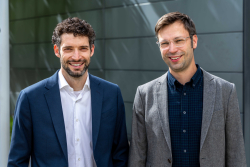
On Tuesday evening, experimental physicist Hannes Bernien and theoretical physicist Hannes Pichler gave their inaugural lectures at the University of Innsbruck. They both presented their research programs to a large audience. The quantum physicists share a common past at Harvard University, which has resulted in a long-standing and successful scientific collaboration, now being continued in Innsbruck.
Experimental quantum physicist Hannes Bernien and theorist Hannes Pichler have both been jointly appointed by the University of Innsbruck and the Austrian Academy of Sciences (ÖAW). Here they work as professors at the university and as scientific directors at the ÖAW Institute for Quantum Optics and Quantum Information (IQOQI). “With the appointments of Prof. Bernien and Prof. Pichler, we are continuing our success story and further strengthening our position as a leading center for basic research in physics”, said Veronika Sexl, Rector of the University of Innsbruck, at the welcoming ceremony. ÖAW President Heinz Faßmann congratulated the new members in a video message, Dean Ruth Breu led through the evening's program.
Ever larger quantum systems for many applications
Colleagues, friends and family came to the large lecture hall on Campus Technikerstraße to celebrate with the two scientists. The two were introduced by the Innsbruck quantum pioneers Rainer Blatt and Peter Zoller. In his lecture, Hannes Bernien presented the experimental platform that he has brought with him to Innsbruck. Neutral atoms trapped in so-called laser tweezers serve him as “Lego bricks” for the construction of ever larger quantum systems. These can already be used to build systems with thousands of particles. In the future, these will also be connected in networks via optical fibers and expanded even further. In his lecture, Hannes Pichler explained what can be done with the quantum systems presented by Bernien and showed examples of applications in quantum simulation, the solution of optimization problems and in quantum computers.
On Hannes Bernien
Hannes Bernien did his undergraduate studies at the University of Hannover in Germany with abroad studies at Seoul National University, Korea and Peking University, China. From 2010-2015 he did a PhD at the Technical University in Delft, the Netherlands, where he and co-workers performed the first loophole-free Bell test. After a postdoc at Harvard in the group of Mikhail Lukin, Bernien set up his own group at the University of Chicago as an Assistant Professor. In 2025 he became full Professor in experimental physics at the University of Innsbruck and a scientific director at the Institute for Quantum Optics and Information at the Austrian Academy of Sciences. Among Bernien’s awards are the Gordon Memorial Speakership 2024, the Klung Wilhelmy Science Award (2023), the New Horizon in Physics Prize by the Breakthrough Foundation (2022), an NSF Career Award (2024), a Sloan Research Fellowship (2021), and the International Quantum Technology Young Scientist Award by IOP (2020).
On Hannes Pichler
Hannes Pichler studied Physics at the University of Innsbruck, completing his doctoral dissertation in Peter Zoller’s research group in 2015. He then carried out postdoctoral research at Harvard University and the California Institute of Technology. Since 2020, Pichler has been a Professor of Theoretical Physics at the University of Innsbruck, while also heading a research group at the Institute for Quantum Optics and Quantum Information (IQOQI) of the Austrian Academy of Sciences. In 2024 he additionally became Scientific Director at IQOQI. Pichler’s research interests span quantum optics, quantum many-body physics, quantum simulation, and quantum computing. In recognition of his work he received an ERC Starting Grant in 2021, the New Horizons in Physics Prize and the Hans-and-Walter-Thirring Prize in 2022, and the Ignaz L. Lieben Prize of the Austrian Academy of Sciences in 2024.